| Inversion of the Population Pyramid |
Since 1963 the global population growth rate has been STEADILY declining. This is not due
to government programs as sociologists and demographers allege. This is the result of people
migrating from the country to the cities. In the cities:
- 1. DDBR sets in.
2. The culture changes as it adapts to the Service and Unemployment Economic System.
3. Humans live longer and have fewer children.
The result is that the Population Pyramid Overturns. Man has no antidote to this phenomenon.
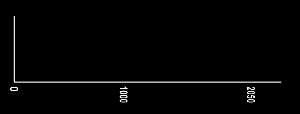
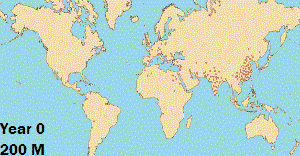
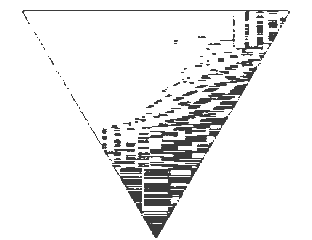
History of Global Population |
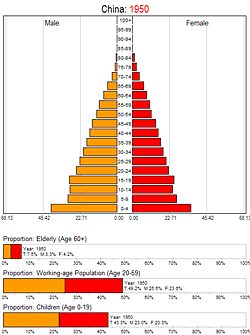
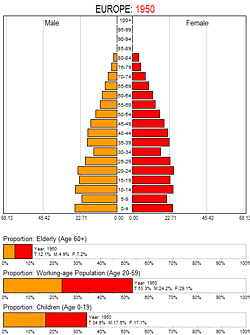
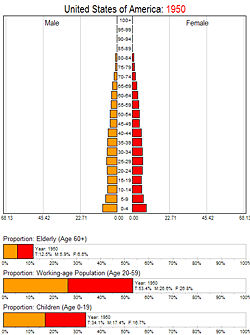
Man is an old species
There can be no doubt that all individuals eventually age and die. It is also pretty much established that
entire species, orders and families of plants and animals have died throughout the history of life on Earth.
One number that is often kicked around is that over 99% of the species of animals that ever lived are no
longer with us. That number is pretty close to what just about anyone would call a 'law of life'. The million
dollar question is whether a species can age. Can interbreeding beings such as the Neanderthals grow
old as a group? Can an entire population age?
One way to approach this question is to look at the species we have the most data for: our own. Is Man
an old species or a young one? Does it even make sense to ask the question? Does it make sense to ask
whether our species is old?
Given no choice, most people would probably answer that we are a young species. If the paleontologists,
biologists, geneticists and related fields have it correct, anatomically modern humans have been around
for only about 200,000 years. In comparison, T-Rex is said to have lived for at least 2 million years and
Dimetrodon for 20 million years. Matched against them we seem to be but babies just crawling out of the
cradle. We have eons ahead of us.
On second thought, perhaps Mother Nature counts birthday candles in a different way. Maybe she doesn't
look at how many times the Earth goes around the Sun. Maybe she looks at the average age of the
population and compares this to the average life expectancy of that species. It is not the same for 10
individuals to have an average of 70 years on a life expectancy of 80 than for the same group to have an
average of 20 years. Clearly, the 70-year group is older than the 20-year group. This has a bearing,
among other things, on whether the group has a chance of reproducing. If we find a colony of 100 humans
on an island and the youngest member is 65, we can be absolutely certain that the colony will end in
extinction. Therefore, the average age of a population in relation to the life expectancy of that species is a
crucial parameter in determining if the species is old. The reproduction rate of the species goes down
drastically with every 50% increase in the average age of the population.
There are a couple of loopholes to this argument and they have to do with how species are manufactured
by Mother Nature. We won't deal with all the possibilities here. We'll just briefly look at the most obvious.
A species is born in isolation from the parent branch. We can be pretty sure that given enough generations
the fledgling colonists will end up being a different species than the one that gave them origin.
Unfortunately, we can't apply this 'rule' to humans because we are the last hominins and we are now
sedentary. We have no other cousins to exchange genes with and we no longer find regions of the planet
where humans can evolve in isolation from the mother group under conditions that require us to
mutate. The age of exploration and colonization is over. For those who missed it, it happened 500 years
ago! We have now conquered every squared centimeter on Earth. We wear heavy coats in Antarctica and
barely anything in the Caribbean. No one needs to develop alligator skin or three ears because of his
environment. Humans will never again change in any meaningful way. We are the perfect (and final)
specimens of our species: the beautiful ones. Man won't evolve into anything in what little time remains for
us on our clock.
This leaves us with the reality that the global human population pyramid began to invert in 1963. Since then
the growth rate has STEADILY declined. It stood at 2.3 in 1963, at 1.2 in the year 2000, and is scheduled
to reach 0 (Zero Population Growth or ZPG) sometime around mid-century. We are not producing children.
This is different than what happened for instance in the 14th Century where disease wiped out a significant
percentage of the population in Europe. Our great grandfathers continued to spit out children and eventually
made up the shortfall. Today, we are no longer producing children at a comparable rate.
Meanwhile, we have extended the life expectancy of humans. We are living longer primarily because of
generous living conditions and because we brought contagious diseases under control. It is as a
consequence of this double whammy -- fewer children and greater life expectancy -- that the human
population pyramid has overturned in the last 50 years and is continuing to overturn. The percentage of
humans that are beyond 40 is growing every year. The older the global population is and the fewer children
it has, the older the entire species is overall. Under this criteria not only are we an old species, but we are
also on our way to becoming extinct.
If aging is a problem, how do we solve it?
Man is an intelligent creature, perhaps the most intelligent that a species can become in the Universe. We
are it! There is no higher intelligence than ours anywhere in the Universe. Those who believe the contrary
have only their mothers to blame. We can understand any explanation that Almighty God and the saints in
heaven wish to give us. Super-intelligence is a myth.
In spite of this, there are things humans simply can't do and problems we cannot solve. One problem that
Man cannot solve is the aging of our species. We work and develop technology to extend our life expectancy.
Everyone wants to live longer. Since the end of the Manufacturing Age, we also embarked on an inevitable
course: from the typical nuclear family to a new kind of family -- the single parent, bachelor and homosexual.
We also moved from the country to the city in every country. Our populations are becoming more urban day
by day. As we move to the cities and live in apartments, density dependent birth rates (DDBR) take over. It
is simply impossible for a couple to have 10 children like in the old days... assuming they would even want
that many children. Not only does the Service Economy forbid it, but the culture has changed. There are no
more empires to bequeath, no land, no property, no wealth, no money and no one to bequeath it to anyway.
There is no purpose to having children any more. The life of the city is little by little becoming the life of
individuals. Despite our intelligence and or technology and our ability to foresee events and react to them,
we have no way of going back to that classical age even if we wanted to. Family type is a deterministic
process over which we have no control. There is one typical family for each major age and economic
arrangement:
- 1. The Age of Hunter/Gathering was in general the age of clans and group marriages.
2. The Age of Agriculture was in general the age of the patriarchal family
3. The Age of Manufacturing was in general the age of the nuclear family.
4. And in the Age of Services and Unemployment we are experiencing the age of
bachelors, single parents and homosexuals.
- There is no future in celibacy and individuality! Each individual simply lives out his and her life. There is no
continuity.
Can we go back to the Manufacturing Age, have more blue collars than white, and replace the individual
with mom and pop and two kids? Can we go back to the Agriculture Age and have men put women under
their control again and turn them into the main slave of the house?
Therefore, even if going back to those glorious days happened to be the solution to the problem of declining
reproduction, despite our intelligence and technology, we would have no way of implementing such a plan.
The only way to get the global growth rate to rise again would be to change the social, economic, and
cultural environment. We would have to return to the old days, to the economic arrangements and family
types of the past. Short of this, we can only continue forward toward ever fewer children and ever more
old people: the overturning of the population pyramid. That's where we're headed.
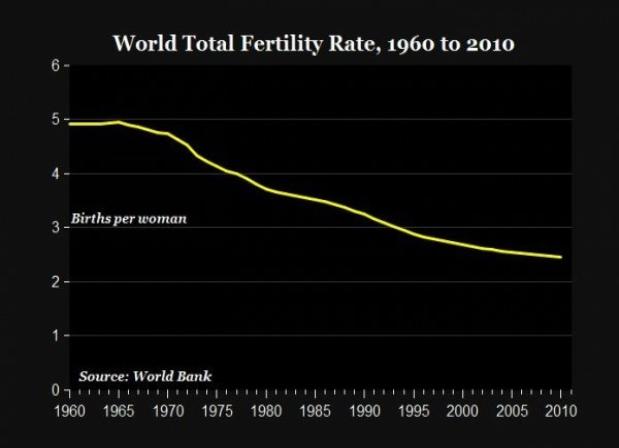
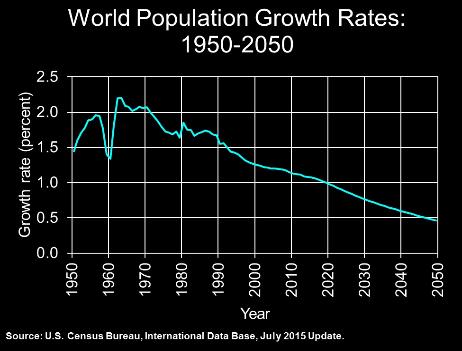
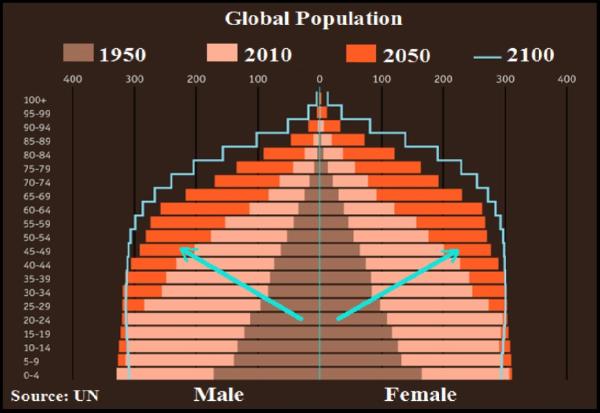
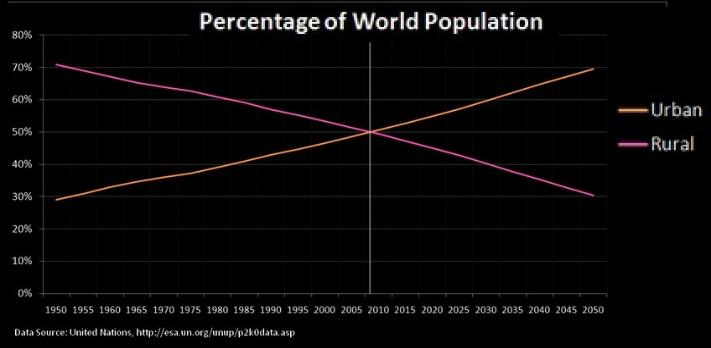
"We are an old species." Overturning of the Global Population Pyramid |
Density Dependent Birth Rates: "We are becoming an urban species." |

.
| To comment on any of the pages in this website go to: Rational Scientific Method |
| The History of Life on Earth |

clan/ group patriarchal nuclear bachelor, single
marriage slavery family parent, homosexual
marriage slavery family parent, homosexual

